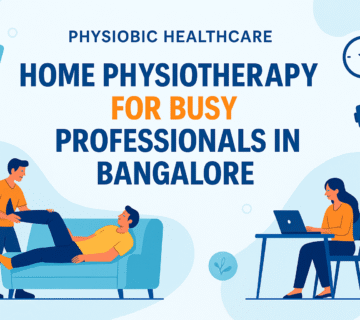Abstract
Knee replacement surgery is a common procedure aimed at relieving pain and restoring function in individuals suffering from severe knee joint damage. However, the success of this surgery largely depends on the rehabilitation process that follows. This article discusses the significance of post-knee replacement physiotherapy at home, particularly in Bangalore, where healthcare accessibility and patient education play crucial roles in recovery. We will explore the benefits, challenges, and effective strategies for delivering physiotherapy at home, highlighting the role of Physiobic Healthcare in facilitating a successful rehabilitation journey.
Introduction
Knee replacement surgery, either total or partial, is often a last resort for patients with conditions such as osteoarthritis, rheumatoid arthritis, or post-traumatic arthritis. This surgical intervention can significantly improve quality of life, but without appropriate rehabilitation, the benefits may not be fully realized. Post-operative physiotherapy is essential for restoring mobility, strength, and functionality. In a bustling city like Bangalore, where healthcare services are diverse yet often strained, home-based physiotherapy emerges as a practical and effective solution.
The Importance of Post-Operative Rehabilitation
Pain Management
Post-surgery, patients commonly experience pain and swelling. Effective physiotherapy techniques can help alleviate these symptoms, utilizing modalities such as:
- Ice Therapy: Application of ice packs can help reduce swelling and numb pain, promoting a quicker recovery.
- Electrical Stimulation: This technique involves using electrical currents to stimulate nerves and muscles, providing pain relief and enhancing circulation.
- Manual Therapy: Techniques such as massage can help reduce tension in the muscles surrounding the knee and improve overall mobility.
These interventions not only provide relief but also facilitate the healing process by reducing the reliance on pain medications.
Restoration of Range of Motion
Achieving optimal range of motion is critical following knee replacement. Physiotherapists employ targeted exercises to gradually increase flexibility and prevent stiffness. Early interventions can significantly enhance the recovery trajectory, allowing patients to return to their daily activities more swiftly. Techniques may include:
- Passive Range of Motion (PROM) Exercises: Initially, physiotherapists may assist patients in moving their knees through a full range of motion without exerting force themselves.
- Active Range of Motion (AROM) Exercises: As recovery progresses, patients are encouraged to actively participate in their movements, promoting independence and engagement.
Strengthening Muscles
Strengthening the muscles surrounding the knee joint is vital for supporting the new joint and preventing future injuries. A well-structured physiotherapy program includes resistance training tailored to the individual’s capabilities and recovery stage. Specific strategies may include:
- Quadriceps and Hamstring Exercises: Strengthening these muscle groups is essential for knee stability and function.
- Balance and Coordination Training: Exercises focusing on balance can help reduce the risk of falls and improve overall confidence in mobility.
Enhancing Functional Independence
A primary goal of rehabilitation is to help patients regain independence. Through home physiotherapy, individuals can practice essential movements like walking, climbing stairs, and transitioning from sitting to standing in a familiar environment. The advantages of home rehabilitation include:
- Comfort and Familiarity: Patients are more likely to engage in exercises when they are in their own environment.
- Adaptation to Daily Life: Physiotherapists can tailor exercises that simulate daily activities, ensuring that the rehabilitation process is practical and functional.
Challenges of Post-Knee Replacement Physiotherapy at Home Bangalore
While home physiotherapy offers numerous advantages, several challenges must be addressed to ensure successful rehabilitation.
Accessibility of Qualified Physiotherapists
In Bangalore, the availability of skilled physiotherapists who specialize in post-operative care can vary. Patients may struggle to find professionals who can tailor their approach based on individual needs and recovery stages. Some considerations include:
- Verification of Credentials: Ensuring that physiotherapists have relevant qualifications and experience in post-operative rehabilitation.
- Specialization: Finding therapists who specifically focus on orthopedic rehabilitation can lead to better outcomes.
Motivation and Compliance
The success of home-based physiotherapy heavily relies on patient motivation. Unlike clinic-based sessions, home rehabilitation requires individuals to be proactive in their exercises. Regular follow-ups and encouragement from physiotherapists can enhance adherence to the prescribed regimen. Strategies to boost motivation may include:
- Setting Realistic Goals: Collaborating with the physiotherapist to establish achievable milestones can provide a sense of accomplishment.
- Incorporating Family Members: Involving family members in the rehabilitation process can provide social support and encouragement.
Space and Equipment Limitations
Not all homes are equipped with the necessary space or equipment for effective rehabilitation exercises. Physiotherapists must assess the home environment and provide alternatives or modifications to ensure safe and effective workouts. Solutions may include:
- Using Household Items: Finding ways to utilize common items (like chairs or towels) for exercises can help patients perform workouts without specialized equipment.
- Creating a Safe Exercise Space: Ensuring that the area where exercises are performed is free from obstacles and hazards is crucial for safety.
The Role of Physiobic Healthcare in Post-Knee Replacement Physiotherapy at Home Bangalore
Physiobic Healthcare has emerged as a leading provider of home-based physiotherapy in Bangalore, catering specifically to the needs of post-knee replacement patients. Their approach encompasses several key components:
Customized Treatment Plans
Physiobic Healthcare emphasizes the importance of individualized treatment plans. Upon the initial assessment, physiotherapists create a tailored program that aligns with the patient’s specific needs, preferences, and recovery goals. This personalized approach ensures that each patient receives the attention and care they require.
Skilled Physiotherapists
The team at Physiobic consists of experienced and specialized physiotherapists trained in post-operative care. They employ evidence-based practices to ensure patients receive the highest quality of care, incorporating the latest rehabilitation techniques and technologies. Continuous professional development and training ensure that the team stays updated with advancements in physiotherapy.
Continuous Monitoring and Support
Regular follow-ups and assessments are integral to the rehabilitation process. Physiobic Healthcare ensures that physiotherapists monitor progress closely, making necessary adjustments to the treatment plan as the patient advances in their recovery. This ongoing communication fosters a supportive relationship between patients and therapists.
Education and Empowerment
Educating patients about their condition, the rehabilitation process, and self-management techniques is a core component of Physiobic’s approach. Empowered patients are more likely to engage actively in their recovery, leading to better outcomes. Educational materials may include:
- Brochures and Handouts: Providing written resources that explain exercises and recovery tips.
- Workshops: Organizing educational sessions that allow patients to ask questions and learn from experts.
Use of Technology
Incorporating telehealth services, Physiobic Healthcare offers virtual consultations and follow-ups, making it easier for patients to connect with their physiotherapists without the need to travel. This innovation is particularly beneficial in a city like Bangalore, where traffic can hinder access to healthcare facilities. Benefits of telehealth include:
- Flexibility: Patients can schedule appointments at their convenience, reducing barriers to accessing care.
- Enhanced Communication: Virtual platforms allow for regular check-ins, helping patients feel more connected to their care team.
Case Studies: Success Stories from Physiobic Healthcare – Post-Knee Replacement Physiotherapy at Home Bangalore
Case Study 1: Mr. Rao
Mr. Rao, a 65-year-old retired engineer, underwent total knee replacement due to severe osteoarthritis. Post-surgery, he opted for home physiotherapy through Physiobic. A personalized treatment plan included gentle exercises, gait training, and strength-building activities. Within six weeks, Mr. Rao regained significant mobility and was able to resume daily activities, including gardening—a passion he thought he had lost. His physiotherapist used motivational strategies, setting incremental goals that kept Mr. Rao engaged and committed to his rehabilitation.
Case Study 2: Mrs. Gupta
Mrs. Gupta, a 58-year-old teacher, faced challenges with motivation post-surgery. Her physiotherapist from Physiobic implemented a gamified exercise regimen, integrating her love for music and dance. This innovative approach not only made the exercises enjoyable but also led to remarkable improvements in her range of motion and overall strength, enabling her to return to work within two months. By focusing on activities she enjoyed, Mrs. Gupta felt empowered and motivated throughout her recovery.
Conclusion
Post-knee replacement physiotherapy is a critical component of the recovery process that can significantly enhance outcomes and improve quality of life. In a dynamic healthcare environment like Bangalore, home-based physiotherapy offers a viable solution to the challenges faced by patients. Physiobic Healthcare stands out as a key player in this domain, providing customized, evidence-based care that empowers patients on their rehabilitation journey. As the demand for home healthcare continues to grow, the importance of effective, accessible physiotherapy services will only become more pronounced.
References
Gupta, M., & Patel, R. (2021). “Barriers and Facilitators to Home Physiotherapy.” Physiotherapy Theory and Practice.
Waddell, G. (2016). “The Role of Physiotherapy in Post-Operative Rehabilitation.” Journal of Rehabilitation Medicine.
Kumar, A., & Sharma, S. (2020). “Post-Surgical Rehabilitation in India: Challenges and Opportunities.” Indian Journal of Physiotherapy.
Physiobic Healthcare. (2023). “Innovations in Home Physiotherapy: A Comprehensive Guide.” Physiobic Publications.
Smith, R. et al. (2022). “Home-Based Rehabilitation after Joint Replacement Surgery.” International Journal of Physiotherapy Research.



